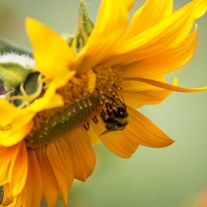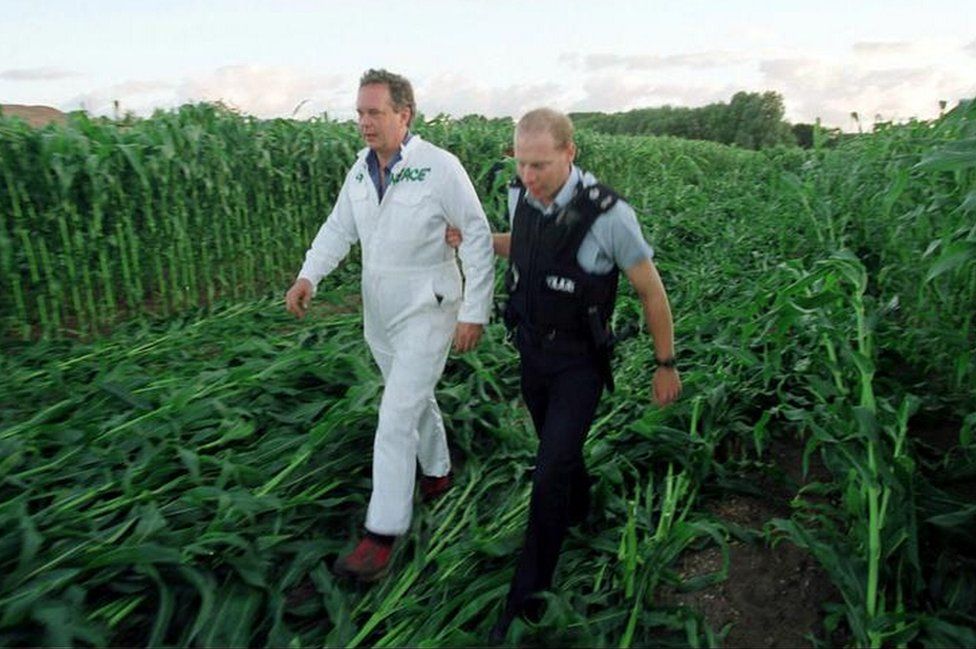
- Soil Association
- Who we are
- Our history

Our history
In 1946, the Soil Association started out on a single farm. Now, we influence the government on UK food, farming and forestry policy, we support businesses to grow and serve sustainable food, and we inspire everyone to be a force for nature.
The Soil Association was founded in 1946 by a group of people who were concerned about the health implications of increasingly intensive farming systems following the Second World War. Their main concerns were:
- the loss of soil through erosion and depletion
- decreased nutritional quality of food
- exploitation of animals
- impact on the countryside and wildlife
Featured on this page:

Lady Eve and other founders with a ram
Lady Eve and the founders of the Soil Association
75 years of pioneering – that's the history of the Soil Association.
We were founded by Lady Eve Balfour, along with a few friends, including Mary Langman.
Lady Eve first decided that she wanted to be a farmer at the age of 12. By the time she was 21, this pioneer of farming bought a farm in Haughley Green, Suffolk with her sister Mary. This farm would go on to become the birthplace of the Soil Association.
The Soil Association was formed following the Haughley Experiment, which also took place on Lady Eve's farm and the results of which were published in her book, 'The Living Soil'.
In this experiment, the farm was divided into three parts. This was done in order to analyse the effects of the intensive methods encouraged after the end of the Second World War that aimed to maximise yields through increasing levels of artificial inputs versus traditional nature-based organic farming. It showed that organic farming did not compromise the overall yield of a farm, and that crops had unique responses when farmed this way, such as developing more complex root systems that can reach out further for water and nutrients.
As this highlights, exploring nature-friendly practices like organic has been at the centre of our work since the very beginning of the Soil Association. We innovate, gather evidence and promote practical changes that anyone can make to improve the health of soil and all those who depend on it for food. Creating a better future for people and planet.
We’ve continued to keep our feet firmly on the ground, trying to find ways we can grow better together. We've achieved many things that we're still proud of to this day, all whilst holding on to the belief that:
The health of soil, plants, animals and (hu)man is one and indivisible.Sir Albert Howard
Our timeline
The 1940s - The Soil Association was founded as an educational and research body
We started out to to initiate, co-ordinate and assist research in the field; to build an informed body of public opinion; collect and distribute research; and bring together all people working to understand the relationship between the health of soil, plants, animal and man.
In 1946, the Soil Association was founded, and the first issue of our journal Mother Earth (now called Living Earth) was published. This first edition included articles on 'The farmer and the Soil Association', 'Soil Deficiency and Disease' and 'Farmers and the Future' among others.
1950s - Spreading the word
The Soil Association continued to work to gather and distribute scientific, agricultural and horticultural information to practitioners and members, in the UK and overseas.
In 1952, The Soil Association's first annual conference 'Health and Soil' makes connections between soil fertility, the presence of trace elements and minerals, and human health.
In 1957, Soil Association membership reached 3,500, from more than 50 countries across the globe.
1960s - Setting standards
Having built up a clearer understanding of how the best of old traditions and new practices in land management could be combined, the first organic standards were compiled defining this system.
Since 1967, we've set these standards for organic food. These provide guidance and give recognition to farmers using nature-friendly production methods and high animal welfare practices.
1970s - Widening appeal and certification
The Soil Association redirected its activities, recognising that the best way to promote its beliefs was to encourage the market for organic produce by making its value to health and nutrition better known.
In 1972, we were one of the founding members of the International Federation of Organic Agriculture Movements (IFOAM), the worldwide umbrella organisation for the organic movement.
In 1973, when there was increasing demand for a system that proved food was high quality and made with integrity, Soil Association Certification was launched - our wholly owned business dedicated to organic and sustainable certification.
1980s - A raised profile and market expansion
As awareness of organic grew in the consumer market, Soil Association looked to its future - as a charity working and campaigning for healthier soil and people.
In 1981, Safeway became the first supermarket to stock organic products, followed by Waitrose, Sainsbury's, Tesco and Marks & Spencer by the end of the decade.
In 1983, we campaigned extensively against the use of DDT and other pesticides. DDT was particularly harmful, causing extensive damage to wildlife and the environment and had a particularly devastating effect on predatory birds who absorbed the pesticide through their prey. Our campaign against it resulted in a full ban in the UK.
In 1984, The Soil Association developed it's ability to communicate with the public through media. Members Patrick Holden and Peter Segger appeared on the BBC Radio programme 'On Your Farm', arousing much interest.
In 1985, The Soil Association moved its office from Suffolk to Bristol.
1990s - Policymaking becomes a key focus
The nation sees expansion of support for organic farming. The Soil Association's ability to influence positive policy change becomes better known.
In 1995, the Organic Aid Scheme was launched, intending to support farmers who wanted to transition to organic. This paved the way for other incentives for both organic and nature-friendly, sustainable farming.
In 1999, we succeeded in getting the EU to ban a number of antibiotic feed additives - medication added to farm animals' diets as a preventative measure against infection. This came after a long Soil Association campaign calling to protect food standards and the welfare of animals through better care rather than relying on preventative medication.
2000s - The Soil Association as a prominent public voice
The benefits of organic farming are formally recognised. The Soil Association starts working closely with other organisations and on government committees for food and farming. The publication of a series of policy reports puts the Soil Association into the political and media spotlight more than ever before.
In 2000, The Soil Association published a report with WWF-UK showing that organic farms support more wildlife than non-organic farms.
In 2001, A comprehensive review of existing research by the Soil Association reveals significant differences in nutritional quality of organic versus non-organic food.
In 2002 Defra publish an Action Plan to develop organic food and farming in England. The plan highlighted the Government's acceptance of a range of benefits attributed to organic farming, as well as targets for growth in production.
In 2003, Food for Life (our champion of healthy, accessible food in schools) was founded in collaboration with Jeanette Orrey. Going from strength to strength in the last 20 years, with Food for Life schools serving over two million meals to children every day. These meals prioritise local sourcing, UK produce, animal welfare and nature-friendly organic produce.
In 2008, Soil Association's Cardiff Conference kick starts a debate about organic farming and food's role in a climate-constrained, post-peak oil world.
2010s - Joining forces for positive change
Empowering the communities we work with to join up and make change together becomes central to the Soil Association's strategy and activities.
In 2012, Innovative Farmers (then known as the Duchy Future Farming Programme) was launched. To this day, Innovative Farmers functions as our programme supporting farmers to find solutions to challenges on-farm and explore sustainable methods that work with nature. Since then, they've run field labs on alternative sheep housing, improving the profitability of hill farms, and seawater-based plant nutrient - among many others!
In 2018, we campaigned alongside our supporters for a ban on the use of neonicotinoids. These insecticides harm the entire food chain and have largely irreversible effects on animals that pollinate our crops like bees. Together, we were successful - the EU banned the use of neonicotinoids on all outdoor crops.
2020s - Demanding climate action
We supported sustainable businesses struggling to maintain standards amidst the exceptional circumstances of the Covid-19 pandemic. As well as continuing to stand as experts in the field of organic, we look for ways to expand our influence and find holistic solutions to climate change that ensure issues such as flooding, low nutrition and supply chain issues are factored into plans for a better future.
In 2020, despite the challenges of the pandemic, Soil Association's Food for Life programme worked hard to provide access to good food, continue food education, and support school cooks and caterers. We also continued to provide information and support to farmers, licensees, citizens and policymakers.
In 2021, we promoted agroecology at COP26 and marched in the farmers bloc with land workers from across the globe on the Global Day of Action for Climate Justice to champion nature-friendly food and farming and agroecology as a climate solution.
In 2022, we launched our Stop Poison Poultry campaign, showing that wildlife, rivers, and farmers in Latin America are being harmed by pesticides used on farms growing feed for chickens in intensive farms in the UK. The campaign generated over 30,000 petition signatures and 1800 emails being sent to supermarket CEOs from the public calling for change.
In 2023 Soil Association and the Woodland Trust jointly launched the UK's first ever Agroforestry show, a festival promoting a "Win-Win" future of farming with trees for climate and farm resilience. Over 1200 delegates came to the show which saw farmers, foresters, researchers, environmentalists, and policy makers sharing insights and advice on how to help farm businesses benefit from trees.

A handful of our staff on one of our regular farm visits
Our future
Over 75 years ago, our founders provided hope during a period when many previously active environmental campaigners stood down in the face of calls for increasingly intensive methods. Today, the knowledge we gained from them is helping us to provide helpful, inspiring solutions fit for our future.
We want to live in a world which is in balance with nature and a future with good health and a safe climate, which means that we:
And, through Soil Association Certification we:
It's our aim to be in an even better place in 2030. We want a bright future - one with good health, balance with nature, and a safe climate. That means taking steps to expand the use of nature friendly and organic farming methods in the UK, and continuing to campaign for measures that will improve soil health.
We support the earth – and, in turn, support The Earth. Inspiring people towards hopeful solutions one step at a time.
-
Feeling inspired? Find out how to take action!
What we do



